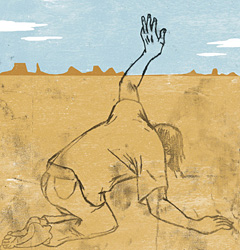 |
 |
 |
 Editorials | Opinions | October 2007 Editorials | Opinions | October 2007  
Let UA Identify Crossers' Remains Found in Arizona
 Arizona Daily Star Arizona Daily Star
go to original


| | Our view: It would be one way to speed up the process for desperate relatives. |
It's horrible when a Mexican family loses a loved one in Arizona's desert. Government and law-enforcement agencies in the United States and Mexico try valiantly with limited resources to identify the remains of illegal immigrants as quickly as possible, but there is plenty of room for improvement in the process of repatriating the deceased and reuniting them with their relatives.

We believe more deceased illegal immigrants can be identified sooner if officials on both sides of the border cooperate more efficiently. An improved process would be an emotional benefit to the deceased's survivors and possibly save money for governmental agencies on both sides of the border.

Scores of illegal immigrants — the vast majority of them Mexicans — die in the Arizona desert every year. Medical examiners' offices in Pima and Cochise counties handled at least 225 bodies in the fiscal year that ended Sunday, the Star's Brady McCombs reported Saturday.

Many of the bodies are unidentifiable. Mariana Alvarado reported in special sections in Friday's Spanish-language La Estrella and Sunday's Star that from September 2004 to December 2006, 137 of 409 border-crosser bodies had yet to be identified.

Families who fear they've lost a relative often must endure a living nightmare — not knowing whether their sons or daughters are alive or dead somewhere in the United States.

Alvarado's stories pointed out that there are no formal procedures for identifying remains found in the desert. The entire process is also slowed by sluggish cross-border bureaucracies.

In ways big and small, procedures can be improved.

The first thing the United States and Mexican governments should do is sit down and talk. We propose that officials from the U.S. State Department, Mexico's Secretariat of Foreign Relations, and tribal and government officials in states along the U.S.-Mexican border hold a summit to create written rules on the handling of remains.

One improvement would be to encourage Grupo Beta, Mexico's special immigrant-protection force, to advise would-be border crossers to travel with proper identification — just in case. This is a somewhat macabre suggestion, but it would reinforce to entrants how dangerous a journey they are about to undertake.

It should be mandatory that remains are kept together with documents, clothing and other property that is found with a body. Alvarado reported that this simple procedure is often ignored or forgotten despite verbal agreements that items should never be separated from remains.

Another step would be to expedite the transfer of documents from Mexico to the United States. A process that should take a day or two often takes weeks because the Secretariat of Foreign Relations requires that all official, U.S.-bound correspondence be sent via diplomatic courier, Alvarado reported.

In following the process of identifying a young man who died in Arizona, Alvarado reported that getting a photo from Ciudad Obregón, Sonora, to Tucson — a distance of about 400 miles — took six weeks. That's an unconscionable lag when families are waiting to hear if they've lost a relative.

Mexico needs to come up with a faster way to transfer documents without first having to send them south to Mexico City, then to the United States.

Another key improvement would be to move DNA testing from Baylor University in Waco, Texas, to the University of Arizona.

Most bodies of illegal immigrants are found in the Tucson sector, so it makes sense to have DNA testing done here. This simple change would save untold costs in shipping remains to Texas and back, and could also reduce mistakes or delays in identifying bodies.

Mexico has an agreement with Baylor in which the school receives $2,000 to conduct each DNA test. The UA and Mexico's government should look into creating a similar pact.

Juan Manuel Calderón Jaimes, the Mexican consul in Tucson, told Alvarado that moving the DNA testing to Tucson could speed up the process. He has already sent a proposal for such a move to the Secretariat of Foreign Relations.

Until the problem of illegal immigration is brought under control, it's inevitable that more people will die in the desert. At the very least, they deserve to be identified and returned to the people who loved them. | 
 | |
 |



